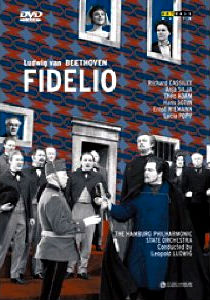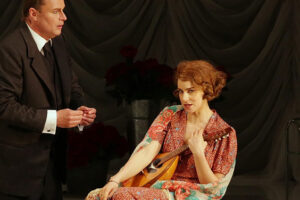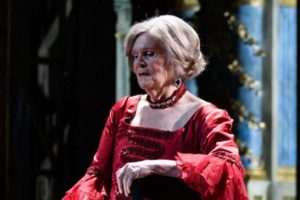
In 1967, Rolf Liebermann , General Manager of the Hamburg State Operas, undertook to produce 13 operas for television, securing the Hamburg-based film and television company Polyphon Film und Fernsehgesellschaft to record the productions with the original Hamburg casts. The director Joachim Hess adapted the stage productions for the requirements of television.
The second of these films was Beethoven’s Fidelio, here released on DVD by Arthaus Musik. While the film techniques are quite rudimentary, this film features a splendid cast without a weak link in the bunch. Much of the opera is staged almost as a concert version in costume (though the dungeon scene is well crafted and acted).
The costumes are brightly colored and simple, and the sets of not particularly high quality; still, the static production serves the music very well in this film by allowing us to focus on the sheer clarion vocalism of this cast, each perfectly suited to their role.
Anja Silja gives us a warm and very human Leonore, beautifully sung and acted with the voice. Her tone is even and rich from top to bottom, and she sings with abandon and ease. She has a charismatic presence and gives a nuanced portrayal of Leonore’s emotional journey.
The excellent Florestan is tenor Richard Cassilly, who surprises here with a clear, lyric sound within a very large voice. I only heard Cassilly in the later years of his career at the Met as Tannhauser and Otello, when his voice had taken on a dark and somewhat gravelly edge. (In fact, I was in the Met Ticket Service during his Otello matinee, when he continually cracked and we had what seemed like every Italian housewife on the Lower East Side calling us to demand that he be dragged off the stage!). Here, his voice is remarkably youthful and fresh, and he and Silja create real chemistry in their reunion. His is a very effective performance.
There are no slouches in the supporting cast, either. Ernst Wiemann is perfect as the jailer Rocco—glowing with fatherly kindness with his voluminous bass. The radiant Lucia Popp is Marzelline, exuding charm and grace with her crystal clear soprano. Tenor Erwin Wohlfahrt is a plangent and lyric Jacquino; sadly, the tenor died at the age of 36 just as his career was peaking.
Theo Adam is a powerful, dark, and supremely villainous Don Pizarro, unctuous and oily one minute, snarling in fury the next. Hans Sotin is a stentorian Don Fernando.
Special kudos also to the first-rate singing of the Chorus of the Hamburg State Opera, and to Kurt Marschner and William Workman for their moving First and Second Prisoners.
In this television film, we never see the orchestra, but the score is handled beautifully by Leopold Ludwig and the Hamburg Philharmonic State Orchestra.
The film is a very valuable document, and one hopes to see more of the Hamburg films that were presented in New York in 1970 (Figaro, Fidelio, Freischütz, Elektra, Zar und Zimmermann and Die Meistersinger).
Fidelio is served wonderfully by the film version—this extremely high quality of singing is a rare thing these days. Fidelio has never particularly moved me before, but this version gives Beethoven’s music real life and great heart.

























Comments